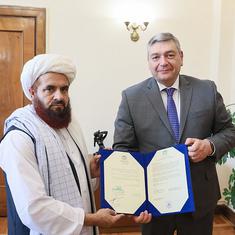MJ Akbar records statement, claims Priya Ramani defamed him by calling him a ‘talented predator’
The former minister said that Ramani’s tweets were picked up by various publications and circulated on social media, which tarnished his reputation.

Former Union Minister of State for External Affairs MJ Akbar on Wednesday appeared at the Patiala House Court in New Delhi to record his testimony in a defamation case against journalist Priya Ramani. Akbar had filed the case against Ramani after she accused him of sexual harassment. Senior advocate Geeta Luthra is representing Akbar in the case.
Akbar said he filed the complaint against Ramani for publishing a series of tweets containing allegations of sexual harassment against him, Bar & Bench reported. Akbar told the court that the first tweet, which came to his notice after he returned from an official tour to Africa, had a link to an article published in the Vogue India magazine. “The article has a history,” said Akbar. “When it was first published in October 2017, it did not include my name.”
“The defamatory or offending portion in particular, apart from the rest of the article, is when she [Ramani] referred to me a ‘talented predator’,” ANI quoted Akbar as saying.
The former minister claimed that Ramani’s tweets on October 10 and October 13 had defamed him. “These tweets were picked up by various publications and did the rounds on social media,” he told the court. Akbar claimed that the tweets affected his “reputation and goodwill”, Bar and Bench reported. “There was immediate damage because of the scurrilous nature of these concocted and false allegations. I was attacked in a personal capacity about fabricated non-events allegedly done two decades ago”, he said.
The court has fixed November 12 as the next date of hearing when it will record the statements of witnesses.
"It has lowered my reputation in the eyes of the right-thinking members of the public, my friends, colleagues, peers and professional and political fraternity, thereby causing irreparable loss to my reputation and goodwill."
— Bar & Bench (@barandbench) October 31, 2018
I've filed criminal defamation complaint against Priya Ramani for a series of tweets that she published. First one came to my notice on my return from my official tour. The tweet had a link to an article in a magazine called vogue: MJ Akbar in Delhi's Patiala House Court. #MeToo pic.twitter.com/o4RTcAwc8A
— ANI (@ANI) October 31, 2018
Akbar, who has been accused of sexual harassment by at least 16 women besides Ramani, resigned from his post as the minister of state for external affairs on October 17. The minister has rejected all allegations against him and has said that Ramani’s tweet accusing him of misconduct was “lowering” his reputation.
Luthra told the court on October 18 that the tweet had reached a wide audience, based on the number of retweets and likes it received. She argued that in order to take action, it is sufficient to show that the tweet was read by a few “right thinking” persons. The counsel highlighted Akbar’s professional history to establish his reputation, and said it has now been tarnished by Ramani’s accusations.
The allegations
In the Vogue India article published last year, Ramani described how an acclaimed newspaper editor called her for a job interview to his “plush south Mumbai hotel” when she was 23 and he was 43. The editor – who she claimed on October 8 was Akbar – did not meet Ramani in the hotel lobby and insisted that she meet him in his room. There, he offered her a drink. Though she refused, he drank vodka himself. She alleged that he went on to sing old Hindi songs to her and at one point, asked her to sit close to him.
Twenty former and current journalists from The Asian Age backed Ramani and asked the court to consider some of their testimonies about their experiences at his hands.
Akbar has called all the allegations “wild”, “baseless” and a “sea of innuendo, speculation and abusive diatribe”. Akbar’s lawyers have claimed that the “false narrative” against him was being circulated in a “motivated manner and for the fulfilment of an agenda”.
Akbar also hinted that there was a political motivation for the sexual harassment allegations as they have come up months ahead of the 2019 Lok Sabha elections. New York-based journalist Majlie de Puy Kamp dismissed this suggestion. “I am not a citizen, I cannot vote,” she was quoted as saying. “I do not have a political agenda.” De Puy Kamp has accused Akbar of sexually harassing her while she was an intern at The Asian Age in 2007.
#MeToo in India
Since October 5, dozens of women, including actors and journalists, have taken to social media to give detailed accounts of the sexual harassment and misconduct they have faced across several sectors such as advertising, Tamil and Hindi film industries, the field of arts, music and dance, publishing, journalism, sports, religion and even non-profit organisations.









